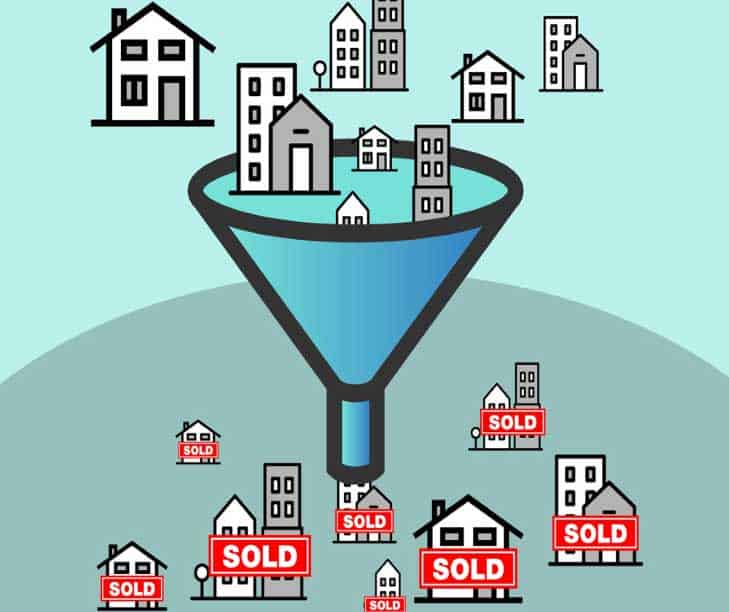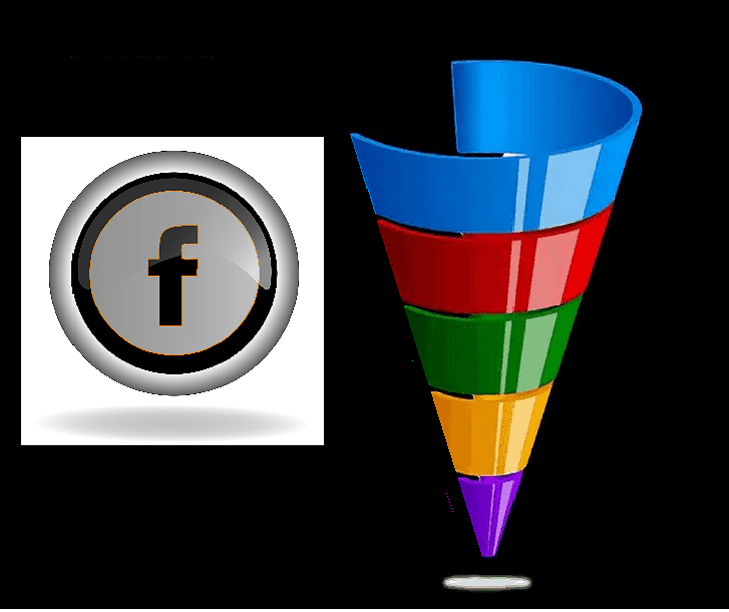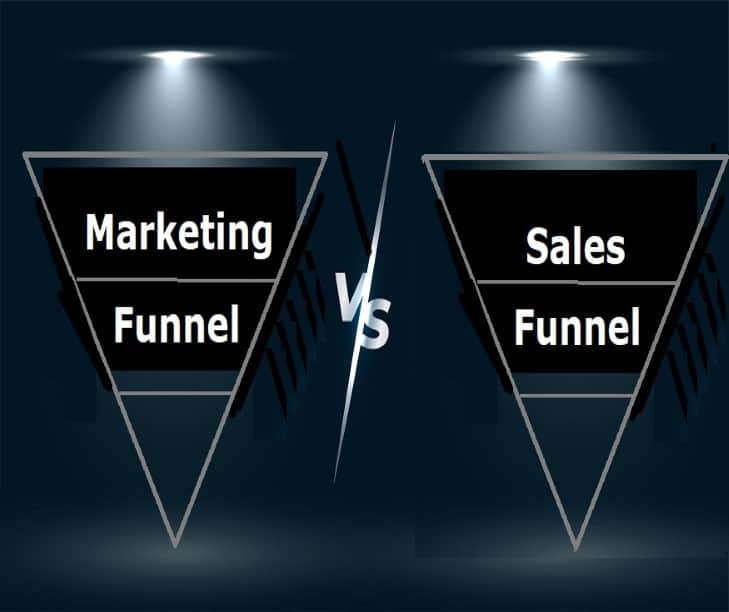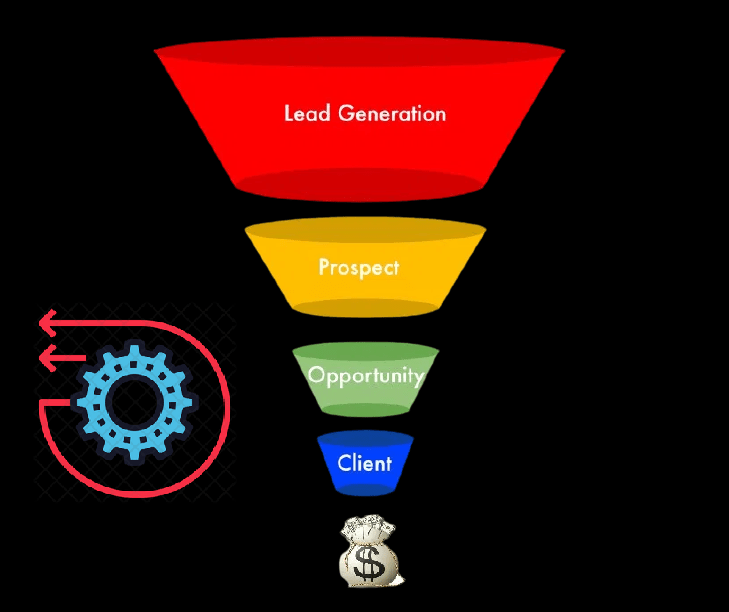Real Estate Sales Funnel – How To Build A Lead Generation System That Sells Homes

What is a real estate sales funnel?
A real estate sales funnel is a web-based system that guides your visitors through your website, converts them into leads, then helps you nurture them into your clients.
For a real estate agent, success requires producing new annual sales to increase commission and profits continuously.
Therefore, to be successful as a real estate agent, you need to compete in the marketplace, always acquire new leads, and convert them into clients. How?
Through the real estate sales funnel!
- What is a real estate sales funnel?
- Building an online sales funnel is necessary since:
- Let's have a closer look at how the real estate sales funnel is built.
- Before we move on to building a real estate sales funnel, let's consider a few preliminary steps.
- Create recognition of your brand.
- Build trust among prospects.
- Work to get a significant number of referrals.
- Step 1: Create landing pages for your real estate sales funnel
- Step 2: Real Estate Marketing Automation
- 1. Lead management
- 2. What are Drip Email Marketing Campaigns?
- 3. SMS Texts
- 4. Generating Facebook Ads
- 5. Social media Engagement
- Conclusion
Building an online sales funnel is necessary since:
- Thoroughly filter out unqualified leads until you get a handful of qualified leads ready to become clients.
- It helps you recognize which advertising component, as well as your sales procedures, are working effectively.
- It breaks down the entire sales journey and shows all the phases needed to close a real estate transaction.
- It helps to identify problematic locations that need improvement.
- It has the potential to drive the sustainable development of real estate contracts as it increases sales.
Let’s have a closer look at how the real estate sales funnel is built.

Before we move on to building a real estate sales funnel, let’s consider a few preliminary steps.
Create recognition of your brand.
Your first goal must be to increase the number of people who know you as a real estate representative. The obvious choice here is the internet.
Your online presence is significant as it will allow you to reach more potential customers.
Start by creating your website, it must be attractive and possibly best optimized for search engines (invest in SEO)
Use social media platforms, make the most of them, mark your presence, and present your ads.
Build trust among prospects.
Buying a property is a serious business. It involves a lot of money, so trust and confidence are fundamental here.
If a home buyer or seller does not trust their real estate agent to care for their interests, they will find another agent.
Create your real estate authority with your email and website content. Share current market trends, talk about neighborhoods where you work, or advise buyers and sellers.
Develop your specialization or brand, e.g., out-of-town properties, luxury real estate, first time buyers, etc. And work on that.
If you have a blog, look for opportunities to share your content on other selling real estate platforms. It will allow you to present your knowledge and experience.
Work to get a significant number of referrals.
The real estate market is specific. Word of mouth is still one of the most excellent ways to succeed. Most successful real estate agents get a significant portion of their business through referrals.
Do a good job, get recommended, but it’s not so easy.
The key to success is continuously developing your network.
Maintain regular email contact with customers so that they can remember your name and recommend your services to family members, neighbors, or friends.
Always answer phone calls and emails promptly, be on time for all meetings, build your reputation.
Any experienced agent will tell you that buying and selling properties is only a small part of his work. Marketing and lead generation is the key to success in this industry.
Step 1: Create landing pages for your real estate sales funnel
After creating your website, you have to develop different landing pages for each specific residential or commercial property.
A landing page is designed to convert visitors into potential customers directly. It is different from other pages on your site.
The page gets traffic from the dedicated link; usually, it’s an advertisement.
Real estate landing pages have one goal: turning traffic into leads.
When someone visits your landing page, encourage them to share their contact details in exchange for something valuable to them, such as a property search, home appraisal, or a market trend report.

Communicate with your clients in powerful new ways.
- Create landing pages with images of interiors, videos of exteriors, and unlimited text.
- Create drip campaigns with information about home inspections, financing, and closings.
- Email a video walk-through of a prestigious home you’re marketing.
As this is the first impression a potential buyer will make on you and your business, it is imperative to adapt it to your brand, message, and customer requirements.
How do landing pages work?
- The visitor sees the call to action and continues to the landing page with a form designed to capture the visitor’s information.
- A visitor fills out a form that transforms them from visitors to potential customers.
- The form field information is then stored in your lead database.
- You advertise to a contact or lead based on what you know about them.
The landing page for a residential property listing should contain basic information such as photo, address, and listing price.
It would help if you also considered creating landing pages for a given residential property based on additional parameters such as demographic data, for example.
If you target young families, the visitor should be redirected to landing pages containing information about nearby schools, kindergartens, health centers, etc.
This way, you guarantee that they will find what they are looking for and increase further contact chances.
Step 2: Real Estate Marketing Automation
The success of a real estate agent depends on many factors. One of the most important is the ability to build strong relationships with potential and existing customers.
The development of these relationships mostly involves adding value to the customer experience. Therefore, automating your marketing tools is an essential part of managing a large amount of your work.

Shift real estate prospects from general to specific campaigns based on time or responsiveness.
- Send Autoresponders on a customized schedule you set in advance.
- Send messages triggered when contacts open specific emails or click links inside emails.
- Design campaigns that update distribution lists with new contacts, location changes, and more.
Automation tools will help streamline better control over paperwork, data entry, social media, and more so you can spend more time and effort nurturing leads and closing sales.
Your first step should be to list all the processes involved and identify which of them are taking the most time so that you can mark them for automation.
Let’s take a closer look at what automation means in real estate marketing and how to bring it to your business.
1. Lead management
Your skill to attract and manage new leads determines your success as a real estate agent. The more leads you acquire, the better. The more leads you can turn into customers, the better.
Real estate is an extremely competitive industry with very low margins. You need something that works, something that is easy to use, and something that automates your routine tasks.
It isn’t easy to manually enter and analyze the collected data about potential customers, so automated tools that will allow you to collect information about a potential customer (landing pages) and save it in your database work so well.
In your landing page’s you can set which fields are required so you avoid getting incomplete information.
This data is then used to manage and categorize the information and to set up automatic communication with your contacts. This is where autoresponders, software that automatically sends emails to your contacts, come into play.
2. What are Drip Email Marketing Campaigns?
The drip campaign is a method used in direct marketing to acquire customers through lead nurture programs.
It involves sending marketing messages to your prospects repeatedly over a long period of time to nurture your prospects or leads through a marketing funnel.
In the real estate market, a great example is the series of emails sent to someone who has given you their email address and thus expressed interest but has not yet decided to contact you directly.
3. SMS Texts
Smart devices enable real estate agents to send and receive automated SMS content, establishing a communication channel with potential buyers, and resolving their problems quickly.
It appears yo be a handy channel for the real estate sales funnel these days. Thanks to SMS messages, you can easily make an appointment and respond by stating availability hours or sending the customer the requested information.
Sendinblue is an excellent example of a tool that provides SMS functionality.
4. Generating Facebook Ads
Facebook Ads are a great way to find new leads to nurture and convert using the enormous wealth of data available on Facebook about users.
This is important for real estate because the more you know about your audience, the better you create relevant ads that result in a higher conversion rate.
If you are new to using Facebook Ads, this may seem a bit intimidating. A lot of help here gives us Facebook Pixel.
This is the code you put on your website. It collects data from your visitors that helps you track conversions from Facebook ads, optimize ads, build a target audience for your future ads, and remarketing for people who have already taken some action on your site.
5. Social media Engagement
A report by the National Association of REALTORS found that 82% of real estate agents are willing and free to use social media. Given that billions of users are on platforms like Facebook, Instagram, and Twitter, it makes sense that more and more real estate agents are using social media to build relationships with potential customers.
Most real estate agents use Facebook to:
- Post photos and information about your property
- Advertise their services
- Share customer opinions
- Provide real estate tips and tricks
- Create surveys and polls
Step 3: Start Generating Leads
Generating leads is an essential part of the real estate sales funnel.
- The primary step of lead generation is identifying your target audience.
- Pick your promotional methods, create and manage your ad campaigns. Consider Google ads.
- Use email newsletters to build relationships.
- Leverage Social Media to connect and engage. Facebook ads, Twitter, or LinkedIn, are still attractive advertising platforms.
Step 4: Nurture Leads
So you have a group of potential customers on your email lists.
Now it’s your job to contact them to find out what kind of properties they are interested in.
Stay tuned for updates of new offers to keep them interested and return them to your website.
The newsletters and emails you create for your contacts in your funnel should be sent to specific segments of the leads who have signed up.
Segmentation is crucial in email marketing campaigns, especially in real estate. Receiving emails or marketing messages that don’t interest you is quite annoying.
Keep subscribers engaged with a mix of relevant content and new offers.

Send real estate information in several formats to reach prospects and clients in a style that suits them best.
- Keep your stay-in-touch messages fresh and exciting with designer templates for seasons, holidays, and special offers.
- Organize webinars or insert a video of a new listing in your email newsletter.
- Create autoresponders that keep prospects engaged until they need your services.
- Let your customers share your messages and landing pages via social media channels.
Focus on communication channels to best define your lead’s needs, organize meetings, and open houses based on those needs.
If the prospect doesn’t transform into a customer, there is still room for further action and further attempts.
In that case, you should use social media and retargeting mechanism. New communications and new offers can drive these potential customers back to your website.
Step 5: Close the Sale & Refill the Funnel
After successfully turning a lead into a customer, the last step in the real estate sales funnel is to close the deal and complete it to repeat the whole process.
You need a set of skills to enter into real estate contracts, such as knowing how to introduce a buyer to the seller, negotiate closing costs, etc.
Very popular funnel building and Email Marketing software is Getresponse and Clickfunnels.
Conclusion
The real estate industry is one of the most competitive industries in the world. It’s very hard to get new customers, and it’s even harder to keep them once they are sold on your service.
This is why having a funnel for your real estate business is so important. It helps you turn your visitors into leads and then into customers.
Investigate a quiz funnel model as an interesting alternative to the classic sales funnel.






